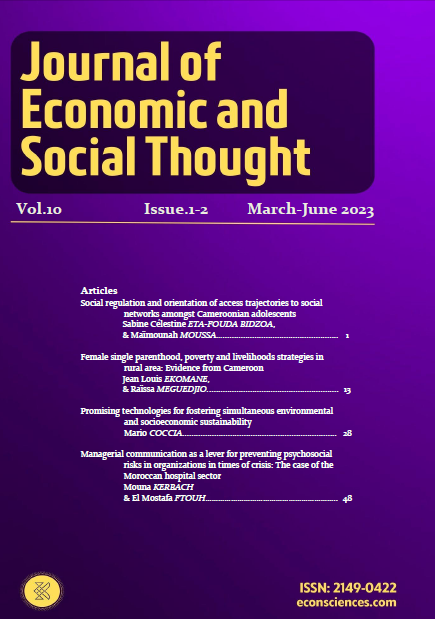Abstract
Abstract. The objective of this research is to establish a connection between social regulation mechanisms and the trajectory of access to social networks among Cameroonian adolescents. The study explores the various normative indications that influence social media users. It is evident that the normative and regulatory framework for accessing social networks and the internet, in general, is not sufficiently coercive and dissuasive to encourage appropriate behavior among young people in cyberspace. Strengthening adolescent security should involve stricter behavioral control, both autonomously and in negotiation with public authorities.
Keywords. Social regulation; Social networks; Cameroonian adolescents.
JEL. A10; E59; N16.
References
Ajzen, I. (1991). The theory of planned behavior. Organizational Behavior and Human Decision Processes, 50(2), 179-211. doi. 10.1016/0749-5978(91)90020-T
Aktouf, O. (1996). La méthodologie en Sciences Sociales. Presses Universitaires de Montréal.
Bandura, A. (2003). Auto-efficacité. Le sentiment d’efficacité personnelle. Paris: Editions de Boeck Université.
Bardin, L. (2011). Content Analisis. Sao Paulo: Edicoes, 70.
Bastard, B. (2013). Désirable et exigeante: la régulation négociée des relations dans le couple et la famille. Dans dialogue (200).109-119.
Fortin, M-F. et Gagnon, J. (2016). Fondements et étapes du processus de recherche: Methodes quantitatives et qualitatives (3ième édition). Montréal, Quebec. Chenelière éducation.
Gaudet, S (2005). Qu’est-ce que répondre de soi à l’adulte? Revue canadienne de sociologie et d’anthropologie /Canadian Review in Sociology and Anthropology, 42, 25-50.
Grawitz, M. (1990). Méthode des sciences sociales, Paris, Dalloz.
Gross, J.J., & John, O.P. (2003). Individual differences in two emotions for affect, relationships, and well being, Journal of Personnality and Social Psychology, 85, 348-362. doi. 10.1037/0022-3514.85.2.348
Kohli, M. (1986). The word of Forgot. Historical Review to the Life Course. Dans V.W. Marshal (dir.), Later life: the social Psychology of Aging (271-303). Londres, Sage Publications
Okene, R. (2013). L’orientation des jeunes en Afrique. Paris: L’Harmattan.
Reynaud, E (2003). Les règles de l’emploi, Dans De Terssac Gilbert (dir), la théorie de la régulation sociale de Jean Daniel Reynaud. Débats et prolongements, Paris, la Decouverte, 149-155.
Reynaud, J.D. (1988). Les régulations dans les organisations: régulation de contrôle et régulation autonome. Revue française de sociologie, 1998, 29-1.
Reynaud, J.D. (1995). Le conflit, la négociation et la règle. Octarès, Toulouse
Skinner, B.F. (1958). Reinforcement today American Psychologist, 13(3), 94-99.

This work is licensed under a Creative Commons Attribution-NonCommercial 4.0 International License.
